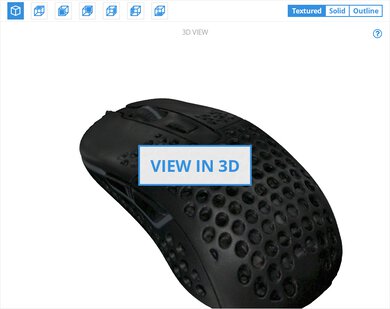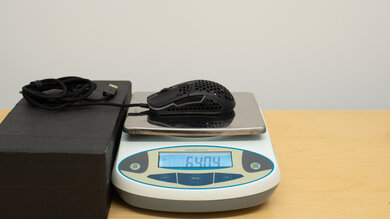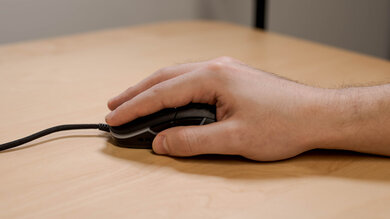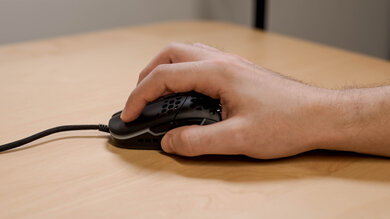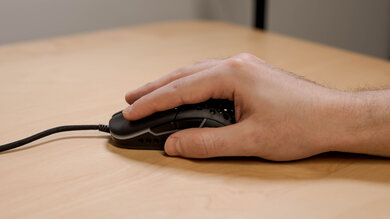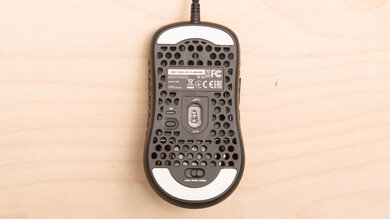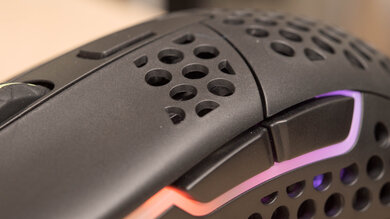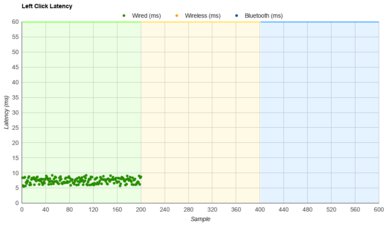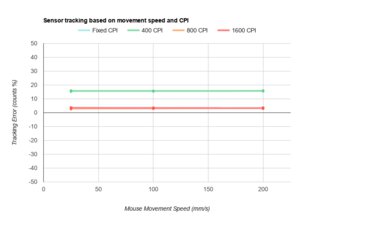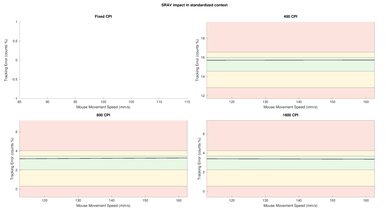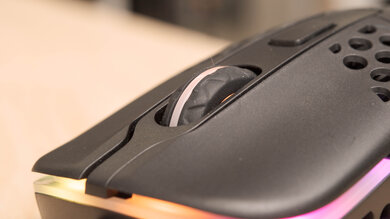The XTRFY M42 is an excellent ultra-light gaming mouse with a build quality that feels very solid and a symmetrical shape that should be comfortable for almost all hand sizes and grip types. It also includes modular back panels that add to the ergonomics by allowing you to swap between a flatter or taller panel to get the best fit for your hand. It's wired-only and has a wide CPI range and low click latency. Unfortunately, it doesn't have companion software, so you can't reprogram buttons. However, you can cycle through RGB lighting, CPI, and polling rate presets with buttons on the mouse.
Our Verdict
The XTRFY M42 is passable for office use. It has an excellent build quality and a symmetrical shape that should be comfortable for most hand sizes and grip types. Unfortunately, the mouse is wired-only, and while it's compatible with both Windows and macOS, its scroll wheel doesn't have any tilt functions and can't be unlocked for free scrolling.
- Excellent build quality.
- Very comfortable to use.
- No software for customization and no programmable buttons.
- Wired-only.
The XTRFY M42 is an impressive FPS gaming mouse. It has low click latency and a wide CPI range. Unfortunately, the CPI isn't very adjustable, with only eight presets to choose from. This mouse has a very lightweight, honeycombed body that feels very sturdy and an ambidextrous shape with swappable back panels that should make it suitable for almost all hand sizes and grips. However, you may find the mouse a little short if you have large or extra-large hands and use a palm grip.
- Excellent build quality.
- Very lightweight.
- Low click latency.
- Modular back panels.
- No software for customization and no programmable buttons.
- Only eight CPI preset options.
The XTRFY M42 is only passable for MMO gaming. It has a symmetrical design with a honeycombed body that provides good grip on both sides and modular panels that help make it well-suited to almost all hand sizes and grips. It also has low click latency and a wide CPI range. Unfortunately, it doesn't have nearly as many buttons as a dedicated MMO mouse, and it has no companion software, so none of the buttons are reprogrammable.
- Excellent build quality.
- Low click latency.
- Modular back panels.
- Very comfortable to use.
- No software for customization and no programmable buttons.
- Not nearly as many buttons as a dedicated MMO mouse.
- Only eight CPI preset options.
The XTRFY M42 is an amazing mouse for ultra-light gaming. Its honeycomb body makes it very lightweight, but it has an overall build quality that feels very sturdy. Its symmetrical shape and swappable back panels make it well-suited to nearly all hand-sizes and grip types, but those with large or extra-large hands may find it too short for a palm grip. Its cable and feet are excellent, and it has very low click latency.
- Excellent build quality.
- Very lightweight.
- Low click latency.
- Modular back panels.
- No software for customization and no programmable buttons.
- Only eight CPI preset options.
The XTRFY M42 is an inadequate mouse for travel as it has a fairly tall profile that may make it difficult to fit into most laptop bags. It's also wired-only, which may be cumbersome in smaller spaces like planes or trains.
- Excellent build quality.
- Very lightweight.
- No software for customization and no programmable buttons.
- May be too large to fit in most laptop cases.
- Wired-only.
Changelog
- Updated Sep 28, 2022: We've converted this review to Test Bench 1.2. This update simplifies our Weight test and expands on our CPI test from Test Bench 1.1, resulting in changes to test results in both sections. For more details, you can see our complete changelog here.
- Updated Sep 21, 2022: We've converted this review to Test Bench 1.1. This update revamps our Click Latency test and results in changes to test results. For more details, you can see our full changelog here.
- Updated Feb 22, 2021: Review published.
- Updated Feb 16, 2021: Early access published.
Check Price
Differences Between Sizes And Variants
The XTRFY M42 RGB comes in a range of color schemes, including, black, white, blue, pink, and retro. You can see our unit's label here.
Popular Mouse Comparisons
The XTRFY M42 RGB is an excellent ultra-light gaming mouse and a continuation of XTRFY's Project 4 lineup. It shares many similarities to the XTRFY M4 RGB, but it actually replaces the XTRFY M2. It features a symmetrical form factor to compete with other ambidextrous mice in the ultra-light category, but it also has a unique modular back panel that allows you to modify the size and shape of the mouse. Unfortunately, its lack of companion software also sets it apart, and none of its inputs can be reprogrammed, which may be a concern for some gamers. For more options check out our recommendations for the best mouse, the best gaming mouse, and the best wired mouse.
The XTRFY M42 and the XTRFY MZ1 – Zy’s Rail are excellent ultra-light wired gaming mice with honeycomb designs. The M42 has significantly better click latency and modular back panels. It's ideal for all hand sizes using a fingertip or claw grip and smaller hands using a palm grip. On the other hand, the MZ1 has a more flexible and lightweight cable and is ideal for a fingertip grip for all hand sizes, though it's also suitable for a palm grip for smaller hands.
The XTRFY M42 and the Razer Viper Mini are both wired, ultra-light gaming mice. The XTRFY has a lower lift-off distance and a wider CPI range; however, it has no companion software, and it only has eight CPI presets that you can switch between directly on the mouse. The Razer has substantially better click latency, and though it doesn't have as wide of a CPI range, you can set the CPI much more precisely thanks to its companion software that also allows for button customization, sensor adjustments, and lighting profiles.
The XTRFY M42 RGB and the XTRFY M4 RGB are both very similar lightweight wired gaming mice. The biggest differences come down to design; while the M4 has a right-handed ergonomic slant, the M42 has a straight ambidextrous design and is about 10g lighter. Other than that, the M42 also has swappable modular back panels, which can help you customize the shape depending on your grip type and hand size. Unfortunately, both lack companion software and have very limited CPI adjustments.
The XTRFY M42 and the GLORIOUS Model D are both excellent wired ultra-light gaming mice. The XTRFY is lighter, has a more ambidextrous design, and features modular back panels. However, it has limited CPI preset options. The GLORIOUS has a right-handed ergonomic shape, lower click latency, and software for customization, which the XTRFY lacks.
Test Results

The XTRFY M42 RGB has a symmetrical shape with honeycomb holes covering most of its surface. The body is matte black, and it has RGB lighting in the scroll wheel, inside the housing, and in a strip around the side and front. It comes with two modular back panels: one is relatively flat, the other has a slightly taller hump. The XTRFY website also provides a 3D .stp file for both covers if you're interested in 3D printing your own back panel.
The XTRFY M42 feels very comfortable, and it should be suitable for most hand sizes and grip types. It has an ambidextrous, symmetrical design, but both its side buttons are on the left. The honeycomb holes in the side provide a bit of extra grip, and the modular panels let you pick whichever feels more comfortable for you. If you want an ambidextrous that's better-suited to those with large hands and has side buttons on the right, then check out the Ducky Feather.
The XTRFY M42 has an impressive paracord-like cable that feels very lightweight, but it has a little stiffness, and it retains some permanent kinks from the packaging. For a similar ultra-lightweight gaming mouse with a cable that's significantly more flexible, check out the XTRFY MZ1 – Zy’s Rail.
The virgin grade PTFE feet are outstanding and are very similar to feet on the XTRFY M4 RGB. They have sharp edges, but they glide really well across mousepads and desks. They do produce a slight scratching sound on desks. There's also an extra set of feet included in the box.
The XTRFY M42 has a standard button layout with two side buttons on the left side. It has no companion software, so you can't program any buttons, but the button just below the scroll wheel controls the RGB lighting, and there's a button on the underside that cycles CPI presets.
The XTRFY M42 has an optical sensor with a wide CPI range. Because there's no customization software, you can only cycle through eight presets via a button on the bottom of the mouse: 400, 800, 1200, 1600, 3200, 4000, 7200, and 16000. There's also a switch on the bottom of the mouse to adjust between the three polling rates: 125Hz, 500Hz, and 1000Hz. If you'd like a similar model with an adjustable CPI, check out the DELUX M700.
The XTRFY M42 has a mouse wheel with incremented steps that feel well-defined and a button that feels responsive and exhibits no wobble. Unfortunately, it can't be unlocked for free scrolling and has no L/R inputs.
The XTRFY M42 doesn't have companion software, but there are controls on the underside that allow you to cycle through CPI and polling rates.
You can shuffle through RGB lighting presets by holding down the button under the scroll wheel, and then clicking the left mouse button to cycle through color pattern speeds and the right mouse button to cycle between colors. Holding the top button and clicking the side buttons changes the brightness.


